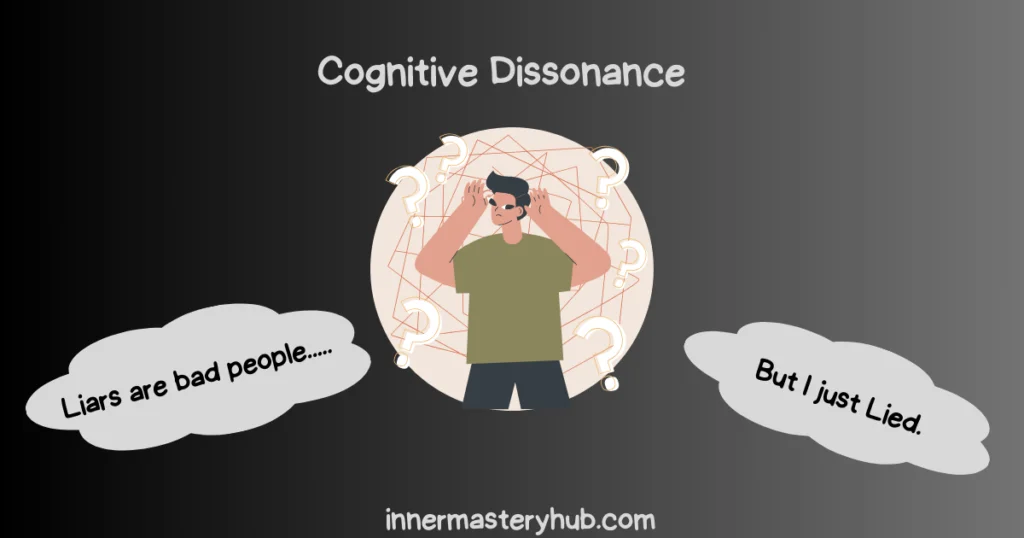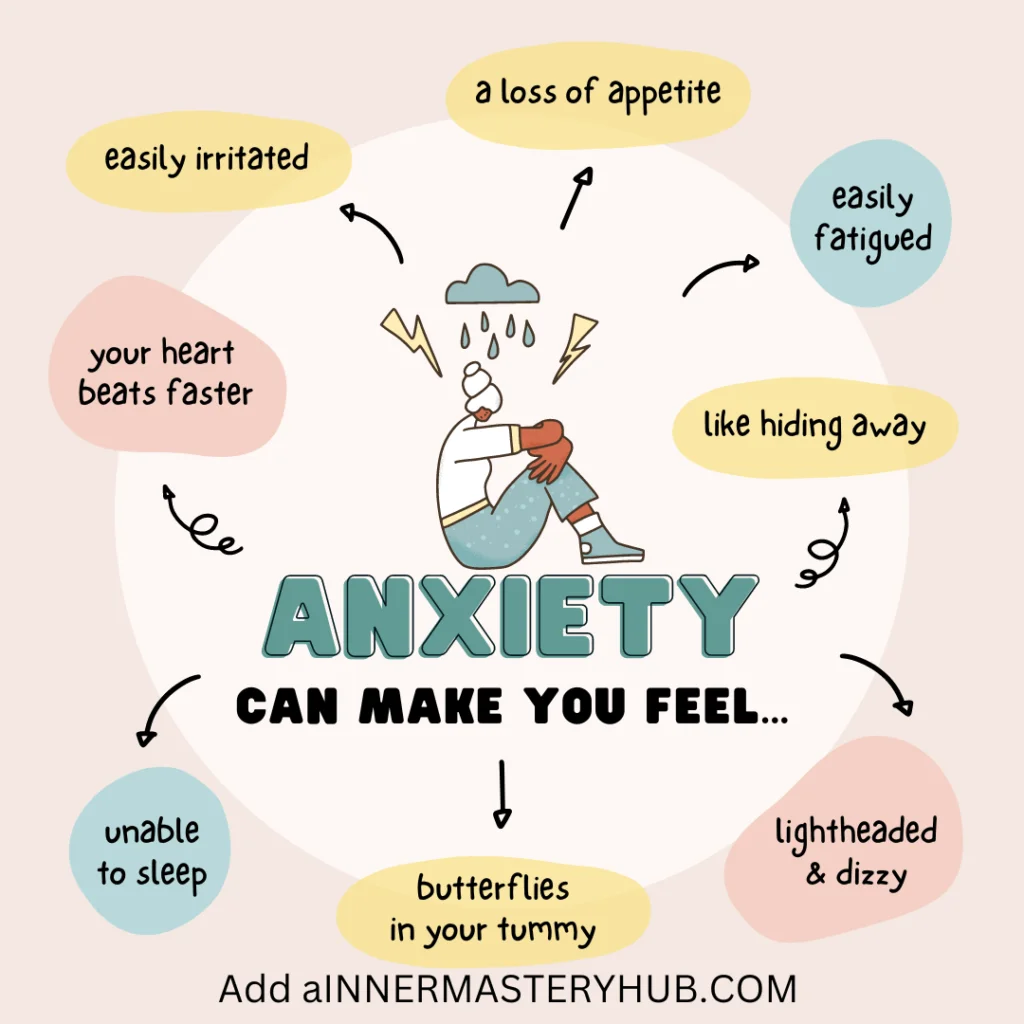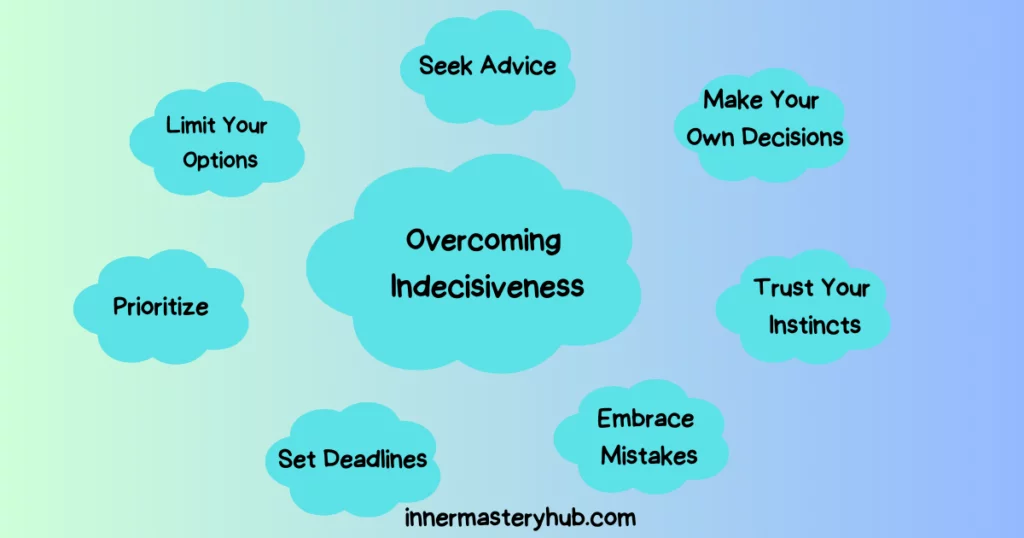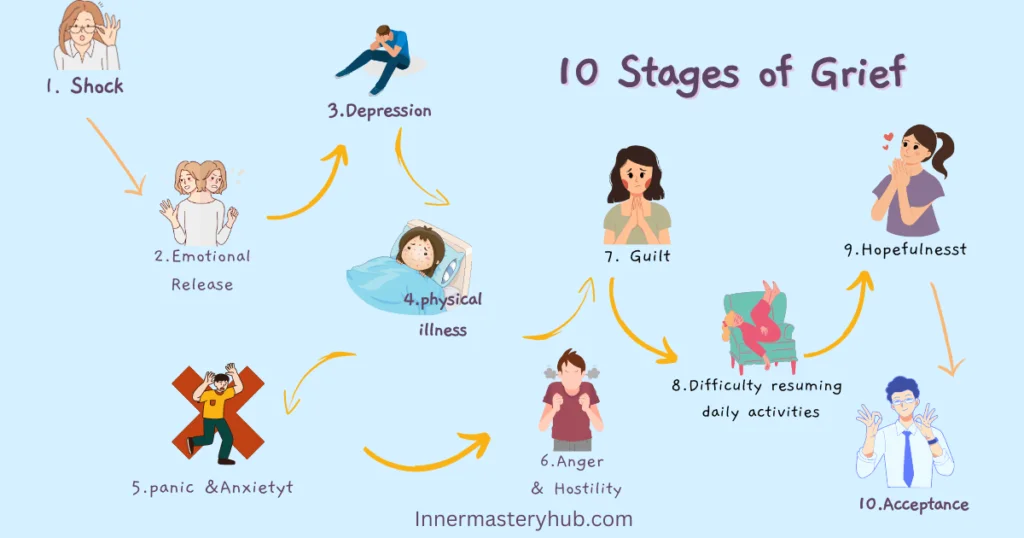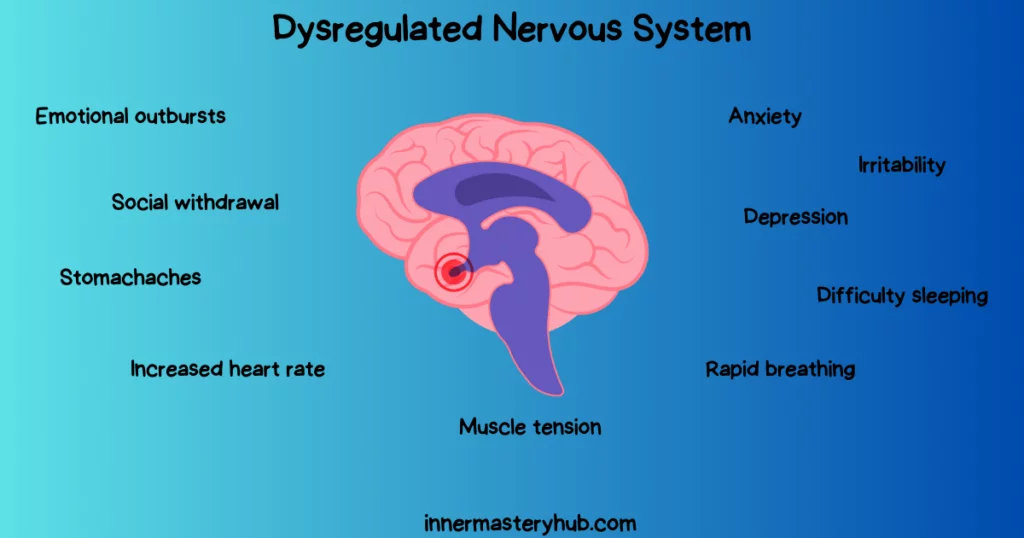
Do you have frequent episodes of impatience, anxiety, and emotional outbursts? It is possible that these could indicate a dysregulated neurological system. You need a healthy nervous system to lead a balanced life.
The body’s nervous system malfunctioning is known as a dysregulated nervous system. A wide range of mental and physical issues may result from this. Let’s investigate this in more detail!
RELATED: Tension in the Neck and Shoulders From Anxiety
Table of Contents
What is the Dysregulated Nervous System? Or Understanding The Autonomic Nervous System
or comprehending The Nervous Autonomic System
Heart rate, breathing, digestion, and sleep are all regulated by the neurological system. A dysregulated neural system may struggle to switch between the parasympathetic nervous system (PNS) and the central nervous system (SNS).
SNS regulates the body’s innate “fight-or-flight” reaction to threat. Blood pressure, muscle tension, and heart rate all increase when SNSs are activated. Though stress or anxiety may be the reason, this is useful in dangerous situations.
The “rest-and-digest” reaction is triggered by the PNS and helps the body relax after a stressful event. In order to assist the body recover from stress, PNS activation lowers blood pressure, slows the heartbeat, and relaxes muscles.
Emotional well-being and stress management are possible when the SNS and PNS are in harmony. On the other hand, overuse of SNS can lead to insomnia, irritability, and anxiety. Overactivity of the peripheral nervous system (PNS) can result in fatigue, depression, and difficulty focusing.
RELATED: 22 ways to improve Cognitive skills, memory and creativity
Signs of Dysregulated Nervous System
A healthy autonomic nervous system maintains homeostasis. Dysregulated nerve systems can cause many physical and emotional disorders.
Physical symptoms
- Increased heart rate
- Rapid breathing
- Muscle tension
- Dizziness
- Nausea
- Fatigue
- Headaches
- Stomachaches
- Pain
Emotional symptoms
- Anxiety
- Irritability
- Depression
- Difficulty concentrating
- Difficulty sleeping
- Emotional outbursts
- Social withdrawal
RELATED: Understanding Enmeshment Trauma: Causes, Effects, and Healing”
Causes of a dysregulated nervous system
A dysregulated nervous system can be caused by a variety of factors, including:
Trauma
Trauma might be compared to an unanticipated dissonance that interrupts the harmony in its different manifestations. Consider your nervous system a compass, always attempting to find true north amid a storm of encounters. Trauma can twist that compass and toss it off balance, whether sudden or sustained.
Stress turbocharges our nervous system. The body’s alarm system releases stress hormones, which are a short-term survival mechanism for urgent dangers. However, if trauma and stress persist, they might alter the neurological system and disrupt its average balance.
Over time, this dysregulation can cause anxiety, mood swings, headaches, hypervigilance, and digestive issues. The body says, “Hey, something’s not right here.” Understanding how trauma affects the neurological system is the first step to recovering balance and a healed and resilient existence.
RELATED: Understanding and Overcoming Traumatic Invalidation
Chronic stress
When stress becomes your constant companion, your neurological system, which is geared to deal with periodic increases, might be thrown off balance. Chronic stress can begin to affect the very core of how your nervous system responds. It may become hypersensitive, reacting violently to mild stresses.
It can set the stage for an array of difficulties, including sleep disturbances, mood swings, and even physical symptoms like muscle tightness or digestive issues. Understanding how persistent stress may modify your neural system is like discovering the map to regaining balance on that tightrope, allowing you to return to a more steady and harmonic rhythm of life.
RELATED: Decoding the Mind: Compulsive vs. Impulsive Behavior
Auto-Immune Diseases And Conditions
ACEs are bad childhood experiences that can happen to a youngster under 18 and can have adverse reactions on your physiological, mental, and physical. For instance, poverty, abuse, neglect, abandonment, a parent with mental illness, or witnessing domestic violence are adverse conditions.
Long-term research links higher ACE scores to a dysregulated nervous system, which can lead to asthma, depression, fibromyalgia, headaches, allergies, diabetes, anxiety, chronic pain, gastrointestinal issues, high blood pressure, rheumatoid arthritis, and even cancer.
Extreme emotional trauma and prolonged stress can damage the neurological system and impair resiliency, making a person vulnerable to physical and mental health issues, according to research.
RELATED: Is It Anxiety Or Intuition?
Mental health conditions
PTSD, depression, and anxiety can combine to create a special mixture that impacts your nervous system. Not merely feeling “depressed” or “anxious,” these circumstances may alter your daily pattern and neural networks.
Consider anxiety as an ongoing concern. Even when there is no danger, your nervous system may overreact to perceived threats, leading to hyperarousal.
Depression, on the other hand, might have an impact on your neurological system and make it more difficult to have social interactions. Your ideas, feelings, and neurological system are all impacted by mental health conditions. The stress response may become dysregulated as a result of emotional fluctuations.
RELATED: Conscience vs. Conscious: Demystifying the Difference
How to Regulate The Nervous System?
Here are some practical ways to heal when your nervous system is dysregulated;
Deep Breathing
For regulating the neurological system, deep breathing is one of the simplest and most effective methods. The parasympathetic nervous system, which encourages relaxation, is activated when you breathe deeply.
Close your eyes and choose a comfortable sitting position. You can also lie down and take deep breaths. Put your palm on your tummy and take a slow, deep breath through your nose. Take a breath and feel your stomach grow. Slowly exhale through your lips. Do this for a few more minutes.
RELATED: Decoding Anxiety Neurodivergence
Meditation
Meditation is another great method for promoting mental, physical, and general well-being. All forms of meditation focus on the present moment, notwithstanding their differences. Find a comfortable sitting or lying position and close your eyes to meditate. Focus on your breathing, letting go of any thoughts that come up. Whenever your mind wanders, simply return your concentration to your breathing.
Time spent in nature
Research has shown that spending time in nature improves mood and reduces stress. Take some time when you’re outside to take in the sights, sounds, and smells around you. Additionally, you can relax outside, go for a walk, or rest by a lake.
Progressive Muscle Relaxation (PMR)
PMR involves systematically tensing and releasing muscle groups to calm the body and mind to heal a dysregulated neurological system. Start by scheduling daily self-care in a quiet place where you can focus. Deep breathing for a few minutes starts the relaxation response. Then, systematically tense each muscle group briefly before releasing and relaxing the area.
Focus on each muscle group’s tension and relaxation during this procedure. Intentional relaxation offers nervous system safety. A daily practice of PMR helps regulate the neurological system and gradually restore balance.
Consider adding mini-PMR sessions to daily life for rapid stress alleviation. Professional help for chronic symptoms or severe dysregulation is recommended for individualized support and tactics. With patience, PMR can help regulate your nervous system equilibrium. Healing is a slow process.
FAQS
How does stress impact the nervous system?
Stress activates the body’s “fight or flight” response, involving the sympathetic nervous system. This triggers the release of stress hormones like cortisol and adrenaline. The heightened state can lead to increased heart rate, elevated blood pressure, and altered energy distribution. Chronic stress may dysregulate the nervous system, impacting mental and physical health.
Techniques for regulating a dysregulated nervous system.
Regulate a dysregulated nervous system with deep breathing, mindfulness meditation, and progressive muscle relaxation. Engage in yoga for a mind-body connection. Utilize biofeedback and grounding techniques, emphasizing the senses. Regular exercise supports overall nervous system health. Experimenting with these techniques fosters resilience and improves mental and physical well-being.
Can a dysregulated nervous system affect mental health?
Yes, a dysregulated nervous system can significantly impact mental health. Chronic stress and imbalances in the sympathetic and parasympathetic nervous systems may contribute to anxiety, depression, and mood disorders. Addressing nervous system dysregulation through various interventions is crucial for maintaining optimal mental well-being.
Exercises for calming a dysregulated nervous system
Calming a dysregulated nervous system involves exercises like deep belly breathing, progressive muscle relaxation, and guided imagery. To promote relaxation, engage in gentle yoga or tai chi. Mindfulness and meditation, such as body scan exercises, can help restore balance. Regular physical activity is essential for overall nervous system health and stress reduction.
Effects of a dysregulated nervous system on physical health
A dysregulated nervous system can negatively impact physical health. Chronic stress, a typical result, may contribute to cardiovascular issues, weakened immune function, digestive problems, and musculoskeletal issues. Sleep disturbances and hormonal imbalances may also arise. Addressing nervous system regulation is crucial for maintaining overall physical well-being.
Neurofeedback and its role in regulating the nervous system
Neurofeedback aids in regulating the nervous system by providing real-time feedback on brain activity. Individuals learn to self-regulate brain function through this biofeedback technique, optimizing neural pathways. It has shown promise in addressing conditions like anxiety, ADHD, and trauma, fostering improved mental health and overall well-being.

